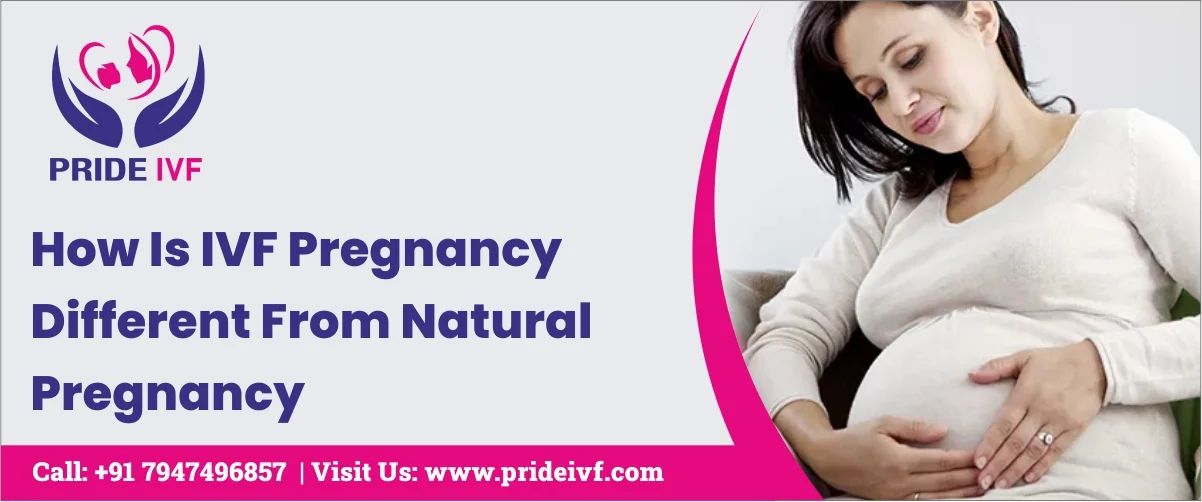Pregnancy is a miraculous journey, regardless of how it begins. However, there are distinct differences between pregnancies conceived through in vitro fertilization (IVF) and those that occur naturally. Let’s explore How Is IVF Pregnancy Different From Natural Pregnancy, these dissimilarities in a simple yet informative manner, aimed at helping you understand what to expect in each scenario.




Fundamentals of Natural Pregnancy
In a natural pregnancy, conception begins with the fusion of sperm and egg during intercourse. The menstrual cycle plays a crucial role, with ovulation occurring mid-cycle when a mature egg is released from the ovary. If sperm meets the egg in the fallopian tube, fertilization occurs. The fertilized egg then travels down the fallopian tube to the uterus, where it implants into the uterine lining. This process sets the stage for the development of a pregnancy, marking the beginning of the incredible journey towards parenthood in the most natural way possible.
Fundamentals of IVF Pregnancy
In vitro fertilization (IVF) is a fertility treatment sought by individuals and couples experiencing difficulties conceiving naturally. It involves a series of steps performed in a medical setting to assist with fertilization outside the body. IVF addresses various causes of infertility, providing hope and alternative pathways to parenthood. This procedure has become increasingly popular due to its effectiveness in helping individuals and couples achieve their dream of having children.
Also Read: How to Prepare for IVF Consultation?, Pregnancy Symptoms After IVF: Week By Week
How Is IVF Pregnancy Different From Natural Pregnancy?
Let’s explore key differences between IVF and natural pregnancies to better understand their unique aspects:
Conception Process
In natural conception, the journey begins when a sperm successfully fertilizes an egg within the woman’s fallopian tube, typically during ovulation. This fertilized egg, known as an embryo, then travels down the fallopian tube and implants itself into the lining of the uterus, where it develops into a fetus.
On the other hand, in IVF, the ivf process is initiated by stimulating the woman’s ovaries to produce multiple eggs. These eggs are then carefully retrieved through a minor surgical procedure. Subsequently, in a controlled laboratory environment, these eggs are fertilized with sperm. Once fertilization occurs, one or more embryos are selected for transfer into the woman’s uterus, where they have the potential to implant and develop into a pregnancy. This distinction highlights how IVF allows conception to occur outside the body, offering an alternative path to parenthood for couples facing fertility challenges.
Timing and Control
In natural conception, timing plays a crucial role as it relies on the woman’s menstrual cycle and the release of a mature egg during ovulation. Factors such as irregular cycles or hormonal imbalances can affect the timing and success of conception.
However, with IVF, there is greater control over the timing of conception. IVF Doctor in Delhi, closely monitor the woman’s menstrual cycle and use medications to stimulate the ovaries to produce multiple eggs. This allows for precise scheduling of procedures, such as egg retrieval and embryo transfer (Also Read: After Embryo Transfer Day By Day Symptoms), maximizing the chances of successful implantation and pregnancy. Overall, IVF offers a level of control and predictability that natural conception may lack.
Preparation
In a natural pregnancy, minimal preparation is typically needed as the process relies on the body’s natural reproductive functions. Couples focus on maintaining overall health through proper nutrition, regular exercise, and avoiding harmful habits like smoking or excessive alcohol consumption.
However, in IVF, meticulous preparation is paramount. This method entails a series of medical interventions, starting with hormone therapy to stimulate the ovaries to produce multiple eggs. Regular monitoring through ultrasound scans and blood tests is essential to ensure the optimal development of follicles. These procedures demand significant time and commitment from both the couple and medical professionals.
Medical Intervention
In a natural pregnancy, medical intervention is often minimal, barring any pre-existing fertility concerns. The conception process occurs without external assistance, relying solely on the natural reproductive cycle.
However, in the case of IVF, medical intervention is extensive and integral to the conception process. This involves a series of carefully planned procedures, starting with hormone injections to stimulate egg production in the woman’s ovaries. Subsequent steps include surgical egg retrieval, laboratory fertilization, embryo transfer, and continuous monitoring. These interventions are meticulously managed by a team of medical professionals to optimize the chances of successful conception for couples facing infertility challenges.
Lets get started
Genetic Screening
In a natural pregnancy, genetic screening is usually reserved for situations where there’s a specific risk or family history of genetic conditions. It’s not routinely conducted as part of prenatal care.
However, IVF presents a distinct advantage with preimplantation genetic testing (PGT). During IVF, embryos can be screened for chromosomal abnormalities or genetic disorders before they’re transferred into the uterus. This proactive approach allows doctors to select the healthiest embryos for implantation, reducing the likelihood of genetic complications and increasing the chances of a successful pregnancy. It offers reassurance to couples seeking to avoid passing on hereditary conditions to their offspring. Also Read: How To Make IVF Successful The First Time.
Embryo Selection
In a natural pregnancy, embryos are conceived within the body without any intervention. Hence, there’s no scope for selecting embryos based on their genetic or chromosomal characteristics. On the other hand, in IVF pregnancies, multiple embryos are created outside the body. This enables fertility experts to carefully assess and choose the most viable embryos for transfer into the uterus. Such meticulous selection enhances the likelihood of a healthy pregnancy while minimizing genetic risks.
Risk of Multiple Pregnancies
In natural pregnancies, the occurrence of conceiving multiples such as twins or triplets is uncommon. This is because typically, only one egg is released during ovulation. However, in IVF, multiple embryos may be transferred into the uterus to enhance the chances of successful implantation. This increases the likelihood of multiple pregnancies. While this can be a desired outcome for some couples, it also raises the risks associated with carrying multiples, necessitating careful monitoring and management by healthcare providers.
Prenatal Care
Prenatal care is vital for ensuring the well-being of both mother and baby during pregnancy, regardless of whether it’s achieved naturally or through IVF. In IVF pregnancies, owing to the intricacies involved in the conception process, healthcare providers often advise additional monitoring and screenings. This is because IVF pregnancies may carry a higher risk of complications, such as multiple gestations or preterm birth, necessitating closer observation and proactive management to ensure optimal outcomes for both mother and child.
Cost Considerations
In a natural pregnancy, expenses are generally limited to routine medical check-ups, prenatal care, and childbirth-related costs. These are usually covered by standard healthcare plans. However, IVF treatments involve significant financial investment, encompassing expenses for fertility medications, procedures, and treatments. Many of these costs are not covered by insurance, making IVF a considerable financial commitment for couples. Thus, the financial aspect is a notable difference between natural and IVF pregnancies in India.
Success Rates
Success rates for natural pregnancies vary due to factors like age, health, and fertility. Younger, healthier individuals typically have higher success rates. IVF success rates in india can vary from clinic to clinic. In contrast, IVF offers more promising outcomes for those facing infertility issues. However, achieving pregnancy via IVF may require multiple cycles. Factors such as the quality of embryos, the woman’s age, and underlying health conditions influence the likelihood of success, highlighting the importance of personalized care in fertility treatments.
By considering these factors, individuals navigating the path of fertility treatment can gain a deeper understanding of the differences between IVF pregnancy and natural pregnancy.
Conclusion
In conclusion, while the end goal of both IVF and natural pregnancies is the same – the birth of a healthy baby – the paths to achieving that goal differ significantly. Understanding these differences can help couples make the best choices about their fertility journey. Whether conceiving naturally or with the help of assisted reproductive technologies like IVF, the journey to parenthood is a unique and beautiful experience.




